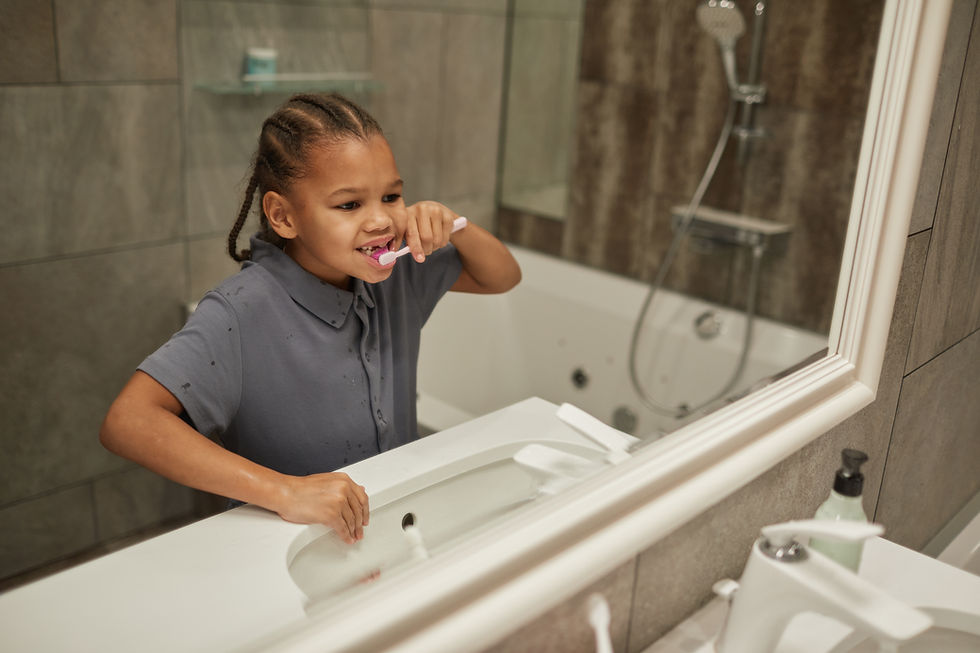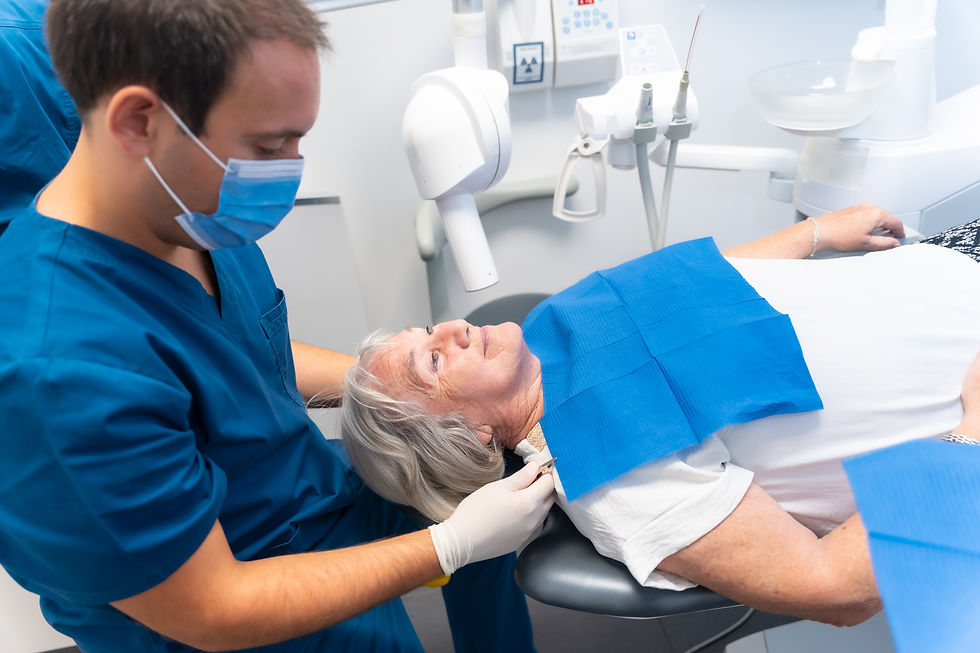Dental Care Tips for Elderly Patients: Ensuring Healthy Smiles in Golden Years
- wguilliouma
- Jun 20, 2024
- 4 min read
As we age, maintaining oral health becomes increasingly important. Elderly patients often face unique dental challenges due to various factors such as medication side effects, reduced dexterity, and age-related conditions. A proactive approach to dental care can significantly improve quality of life, making daily activities more comfortable and enjoyable. Here are some comprehensive dental care tips for elderly patients to keep their smiles healthy and bright.

1. Consistent Oral Hygiene Routine
Brushing: Encourage elderly patients to brush their teeth at least twice a day using a fluoride toothpaste. A soft-bristled toothbrush is ideal to prevent damage to gums and enamel. Electric toothbrushes can be particularly beneficial for those with limited dexterity, providing a thorough clean with minimal effort.
Flossing: Daily flossing is crucial to remove plaque and food particles from between teeth. For those who find traditional floss challenging, alternatives like floss picks, interdental brushes, or water flossers can be easier to use.
Mouthwash: An antimicrobial mouthwash can help reduce bacteria, freshen breath, and prevent gum disease. Look for alcohol-free options to avoid further drying out the mouth.
2. Denture Care
For elderly patients who wear dentures, proper care is essential to avoid infections and ensure comfort. Dentures should be cleaned daily with a denture cleaner, not regular toothpaste, which can be too abrasive. Remind patients to remove their dentures at night to give their gums a rest and reduce the risk of oral infections.
3. Balanced Diet and Hydration
Nutrition: A diet rich in vitamins and minerals, particularly calcium and vitamin D, supports bone and dental health. Encourage the consumption of dairy products, leafy greens, nuts, and fish.
Limit Sugary Foods: Reducing intake of sugary and acidic foods and beverages can prevent tooth decay. Opt for healthier snacks like fruits, vegetables, and cheese.
Stay Hydrated: Adequate hydration is vital, especially for those suffering from dry mouth. Drinking plenty of water helps keep the mouth moist and washes away food particles and bacteria.
4. Regular Dental Check-Ups
Routine dental visits are crucial for elderly patients. Schedule check-ups at least twice a year for professional cleanings and examinations. These visits allow dentists to detect and treat issues like cavities, gum disease, and oral cancer early on.
5. Managing Dry Mouth
Dry mouth, or xerostomia, is a common issue among the elderly, often caused by medications. It can increase the risk of tooth decay and gum disease. Here are some tips to manage dry mouth:
Stay Hydrated: Encourage frequent water intake.
Saliva Substitutes: Over-the-counter saliva substitutes and sugar-free gum can stimulate saliva production.
Avoid Dehydrating Substances: Limit alcohol, caffeine, and tobacco, which can exacerbate dry mouth.
6. Addressing Tooth Sensitivity
Tooth sensitivity can be a common problem for elderly patients. To alleviate discomfort:
Desensitizing Toothpaste: Use toothpaste designed for sensitive teeth, which can help block pain associated with sensitivity.
Gentle Brushing: Opt for a soft-bristled toothbrush and gentle brushing techniques to avoid aggravating sensitive teeth.
7. Special Considerations
Medication Effects: Be aware of medications that can impact oral health, such as those causing dry mouth or gum inflammation. Discuss with healthcare providers to explore alternatives or additional treatments to mitigate these effects.
Dexterity Issues: For patients with limited dexterity due to conditions like arthritis, electric toothbrushes and adaptive devices can make oral care easier and more effective.
Gum Health: Monitor for signs of gum disease, including bleeding, swelling, or recession. Promptly address any issues with a dentist to prevent progression.
8. Dealing with Tooth Loss
Tooth loss is not uncommon among the elderly, but it’s important to address it to maintain oral health and overall well-being.
Dentures: Ensure dentures fit properly to avoid sores and discomfort. Regular adjustments by a dentist may be necessary.
Dental Implants: Consider dental implants as a more permanent solution for missing teeth. They can improve chewing ability and prevent bone loss.
9. Education and Support
Educating elderly patients and their caregivers about proper oral hygiene practices is essential. Provide resources and demonstrations on brushing and flossing techniques, and emphasize the importance of regular dental care.
Caregiver Assistance: Caregivers should be trained to assist with daily oral hygiene tasks if the patient is unable to manage them independently.
Oral Health Education: Highlight the connection between oral health and overall health, stressing how poor oral hygiene can contribute to systemic conditions like heart disease and diabetes.
10. Addressing Common Issues
Gum Disease: Elderly patients are at a higher risk for gum disease, which can progress rapidly without proper care. Maintain good oral hygiene and seek prompt treatment for any signs of gum disease.
Tooth Decay: Fluoride treatments and dental sealants can help protect against tooth decay. Regular dental visits ensure early detection and treatment of cavities.
Conclusion
Maintaining good oral health in elderly patients requires a combination of consistent personal hygiene, proper nutrition, regular dental visits, and specialized care for those with unique challenges. By following these comprehensive dental care tips, elderly patients can enjoy healthier teeth and gums, leading to improved overall health and a better quality of life. Encourage a proactive approach to dental care, and ensure that both patients and caregivers are well-informed and supported in their efforts to maintain optimal oral health.




Comments